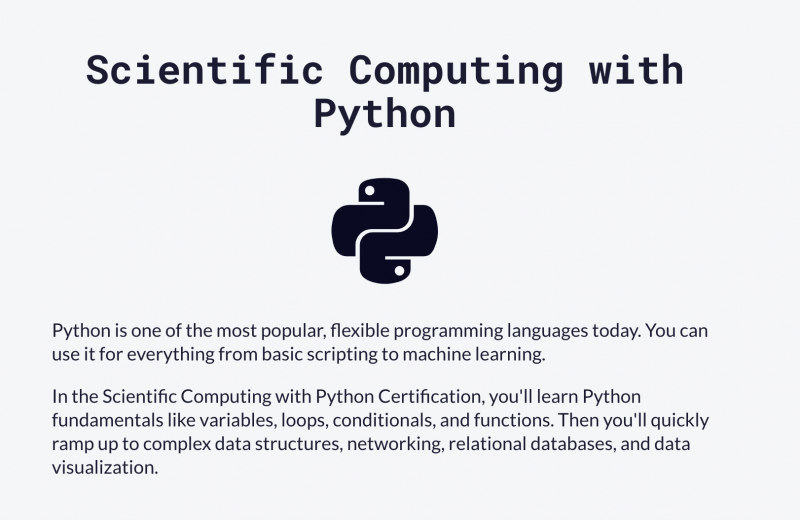Scientific Computing with Python

Scientific Computing with Python is at the top of the list of best online python courses.. Python is one of the most popular, flexible programming languages today. You can use it for everything from basic scripting to machine learning. In the Scientific Computing with Python Certification, you'll learn Python fundamentals like variables, loops, conditionals, and functions. Then you'll quickly ramp up to complex data structures, networking, relational databases, and data visualization.
The freeCodeCamp course Scientific Computing with Python is based on Python for Everybody, the Coursera specialization that includes this ranking's top pick. While the specialization on Coursera is paid, you can earn a free certificate of completion on freeCodeCamp. Furthermore, the freeCodeCamp certification includes additional projects, so if you've completed Python for Everyone and want to put your newly acquired knowledge to use, you'll find some hands-on opportunities here.
What You’ll Learn
- Apart from the material from Python for Everybody, you’ll work on five scientific computing projects. Scientific computing is most commonly needed in specialized and technical industries, like engineering or data science. In each project, you will be given some starter code and will be tasked with completing it.
- The first project involves building an arithmetic formatter that aligns arithmetic expressions vertically, just the way you would if you were doing the calculations by hand. You will learn to parse strings, how to deal with edge cases, and also learn how to prettily format text in the command line.
- The second project involves creating a time calculator. You will have to parse an initial time and weekday, add a particular duration to it (say 14 hours), and finally return the new time and day.
- In the third project, you will make a budgeting app. By the end of the project you’ll understand how to create classes and attributes that serve as budget categories, and then print a graph in the command line representing the percentage spent per category.
- For the fourth project, you are tasked with creating rectangle and square classes. These classes should contain the shape attributes as well as methods for calculating the area or getting a string representation of the shape. So you’ll really get to practice OOP, and in particular, inheritance.
- Lastly, the fifth and final project requires you to write a function that can determine the probability of drawing balls of certain colors randomly from a hat. With object oriented programming, you will learn how to create a function with varied arguments, work with Python’s random module, and gain some insight into statistics and probabilities.
How You’ll Learn
- The full 56 lecture set of Python for Everybody is available on freeCodeCamp. And after each lecture, you will be quizzed on what you’ve learnt from the video.
- In total, the certification may take up to 300 hours to complete, but if you already know some of the rudiments of programming, it might take you half as long.
- You’ll also create 5 scientific computing projects, each graded automatically.
Fun Facts
- As you may know, freeCodeCamp is a nonprofit that helps people learn to code by building projects, for free. They offer 10 courses with free certifications.
- freeCodeCamp’s Youtube Channel has more than 5M subscribers and 1200+ videos on a wide variety of programming and computer science topics.
- If you’d like to support freeCodeCamp’s mission of providing free education, you can make a donation here.
- More on Dr. Chuck: he is the Clinical Associate Professor of Information at the University of Michigan, and besides freeCodeCamp, his course is offered on Coursera, edX, and FutureLearn — so pretty much on all major platforms.
Rating: 5.0/5.0
Enroll here: classcentral.com/course/freecodecamp-scientific-computing-with-python-34065










